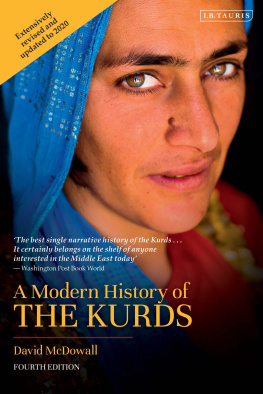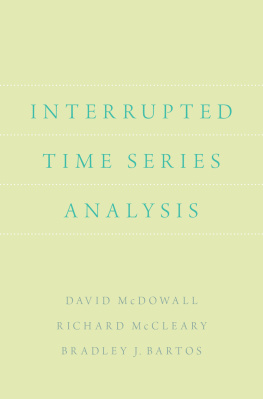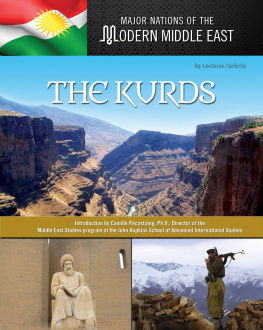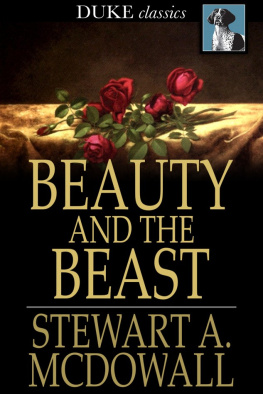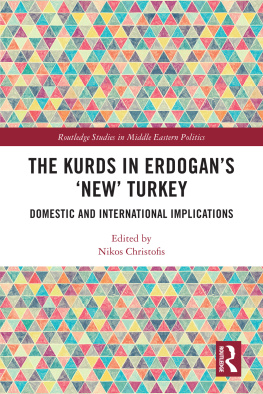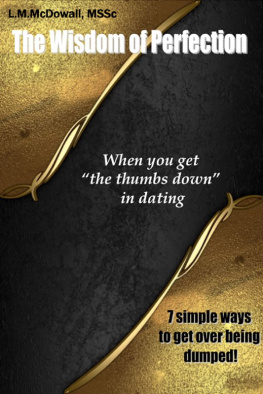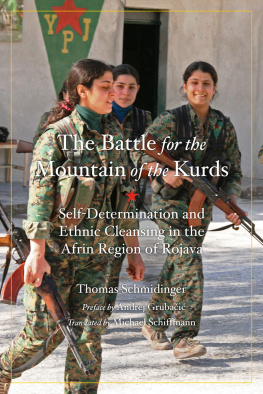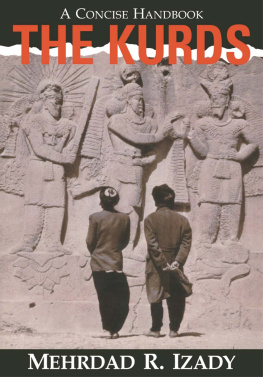
A Modern History of the Kurds
In Memory of Albert Habib Hourani (1915-1993)

Contents
For the first edition, I relied on a few books for many chapters. Rather than cite them repeatedly in the list of sources for each chapter, they are listed here:
Published
Martin van Bruinessen, Agha, Shaikh and State: The Social and Political Structure of Kurdistan(London, 1992).
Gerard Chaliand (ed.), A People without a Country: The Kurds and Kurdistan(London, 1980).
Abdal Rahman Ghassemlou, Kurdistan and the Kurds(Prague and London, 1965).
Chris Kutschera, Le Mouvement National Kurde(Paris, 1979).
Basil Nikitine, Les Kurdes: tude Sociologique et Historique(Paris, 1956).
Arshak Safrastian, The Kurds and Kurdistan(London, 1948).
Muhammad Amin Zaki, Khulasa tarikh al Kurd wal Kurdistan, vol. i: Min aqdam al usur al tarikhiya hatta alan(Cairo, 1939/Beirut, 1961/London, 1986); vol. ii: Tari kh al dual wal amarat al Kurdiya ftl ahd al Islamiya(Cairo, 1948/London, 1986).
Unpublished
Wadie Jwaideh, The Kurdish national movement: its origins and development (PhD dissertation, Syracuse, 1960).
Anyone writing a book of this kind knows how greatly indebted they must be to innumerable helpers along the way. During this process, perhaps because I am now in my mid-seventies, I think of those who enriched my understanding from my earliest days as an undergraduate: both teachers and fellow students. This edition is dedicated to the memory of Albert Hourani who, through his teaching and friendship, and in tandem with his wife, Odile, fundamentally changed the course of my life and of my values. But there were, of course, others who were generous to me and whom I probably failed to acknowledge at the time in that casual disregard with which the young take the kindness of others so much for granted.
I am also indebted to several institutions which have been indispensable: the British Library, the National Library of Scotland, the London School of Economics and, above all, the London Library. In addition, I also owe a great debt to al-Monitor, to its excellent correspondents who comment with such insight on events in the region, and also to Academiaon whose website so many scholarly pieces are posted.
In addition to those who helped when I wrote the first edition over twenty-five years ago, I am very grateful to all those, including those who do not know it, who have been of help in the present updating: Nadje al-Ali, Andrew Apostulos, Essam Awny, Mustafa Barcho, Cengiz andar, Toby Dodge, Stuart Horsman, Farideh Koohi-Kamali, Lokman Meho, Susan Meiselas, Khanna Omarkhali, Perihan zblat, Neil Sammonds, Omer Sheikhmous, Yaniv Voller, Nicole Watts, Stefan Winter, all of whom have been generous with their knowledge and given me useful insights. I am also most grateful to Angela and Bernard Mouscadet for the use of the library at Chtelperron, the calmest room I know, even with grandchildren running through it, brandishing wooden swords. I am particularly grateful to those who set aside time to be interviewed: Shivan Fazil, Fazel Hawrami, Guita Hourani, Isabel Kser, Mehmet Kurt, Houzan Mahmoud, Nazira Mehmari and zlem Belim Galip. Mehmet Kurt not only gave me time but generously allowed me to read Kurdish Hizbullah in Turkeybefore its publication, as did Houzan Mahmoud with Kurdish Womens Stories. My greatest immediate debt, however, is to Zeynep Kaya and Robert Lowe at LSE Middle East Centre. They have no idea of the value of their generous encouragement, provision of copies of their own work, invitation to use LSEs library facilities and inclusion in the workshops and seminars they ran at LSE. They kick-started my re-entry into Kurdish studies after many years engaged in work wholly unconnected with the Middle East. At the very end two peer reviewers, Gne Murat Tezcr and a second, anonymous, reviewer, diligently saved me from errors of fact, judgement or emphasis. That there are still errors of fact and judgement I do not doubt, but I am wholly responsible for them. I am also most grateful to my editor, Sophie Rudland, and copy-editor Ben Harris, for shepherding this book to completion. I apologise to those I may have forgotten, of whom there will inevitably be some.
Next page
